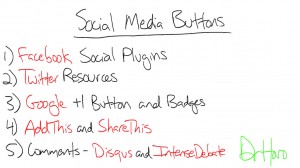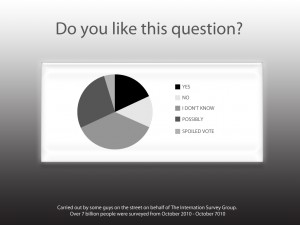Reviewing the Standard on Digital Recordkeeping March 27, 2014 1 Comment
The Standard on Digital Recordkeeping articulates the core requirements that State Records sets public offices for managing their digital information. The standard was issued in 2008, so it is due for a review. Since then, there have been major changes to the structure and operations of government, and to the digital technologies which support government operations.
As part of the review process, we have put out a survey asking detailed questions about implementation of the standard, so that we can understand what is most effective, and what requires the most improvement. We are trying to find out how well the standard supports information management outcomes, and have tried to define this broadly.
Managing social media information – frequently asked questions March 14, 2014 No Comments
 Here are some of the questions we get asked about government use of social media:
Here are some of the questions we get asked about government use of social media:
- what is the legal status of information in social systems?
- does the State Records Act apply to social media?
- does defamation law apply to social media?
- how does the Privacy and Personal Information Protection Act apply to social media?
- how do I know if I need a social media information management strategy?
- what are the business benefits of developing a social media information management strategy?
- Read the rest of this entry »
Tools for capturing social media information February 28, 2014 2 Comments
 As social media is relatively new and rapidly evolving technology, there are no defined, best practice ways for making and keeping social media information as a business asset.
As social media is relatively new and rapidly evolving technology, there are no defined, best practice ways for making and keeping social media information as a business asset.
Organisations also use different social media channels, in a variety of different ways and for various different types of business operations.
Given there are no easy answers for how you should capture and manage your social media information, you should choose the strategies that best meet your business needs and technological environment, while making a full assessment of the potential risks involved. Read the rest of this entry »
Management strategies for social media information No Comments
 There are a range of information management strategies you can apply to your social systems, based on your specific business needs and risks.
There are a range of information management strategies you can apply to your social systems, based on your specific business needs and risks.
The strategy you choose needs to be based on an analysis and understanding of business needs and risks. You may need to choose different information management strategies for each of the different social media channels used, depending on the different levels of traffic, risk and discussion within these channels.
Any information management strategy you choose should be regularly reviewed, as your organisation’s use of social media may move from a fairly passive use to active and engaged. Once social media channels become widely accepted for business communication and engagement in your organisation, it is likely there will be a greater need for effective management of the information generated.
Strategies to choose between are:
- Leave the information where is it strategy
- Low level information management strategy
- Monitoring-based information management strategy
- Needs-based information management strategy
- Reporting as an information management strategy
- Information for reuse strategy
- Information management for accountability strategy
- Information management through broadcast systems strategy Read the rest of this entry »
Managing social media business information 2 Comments
 State Records’ revised guidance on managing social media business information is being progressively published over the next few days. Here are the first few slices. If you have any suggestions for improvements, please let us know.
State Records’ revised guidance on managing social media business information is being progressively published over the next few days. Here are the first few slices. If you have any suggestions for improvements, please let us know.
Summary
NSW Government has a strong and growing social media presence.
Studies of government use of social media show that social media can enable government to reach new audiences, establish communities of practice, provide services and deliver important and effective messages to the community. (See, for instance, New Zealand Government Controller and Auditor-General, Learning from public entities’ use of social media, June 2013) Read the rest of this entry »
Information management in Enterprise Resource Planning systems February 26, 2014 No Comments
 Many agencies have consolidated Finance, HR and other systems to Enterprise Resource Planning systems such as SAP and Oracle, or are currently planning such a consolidation.
Many agencies have consolidated Finance, HR and other systems to Enterprise Resource Planning systems such as SAP and Oracle, or are currently planning such a consolidation.
State Records is often asked about the implications of this under the State Records Act. Here are the sorts of things we talk about. Read the rest of this entry »
Digital archives update February 25, 2014 2 Comments
It’s two and a half years into the three year Digital Archives project and we have been working hard on our pilot projects, in particular the records of the Special Commission of Inquiry into Electricity Transactions and records of former State Premiers Carr, Keneally and Rees. Key applications have been developed to support the migration of records into the repository, including the creation of additional copies of certain formats for preservation and access purposes, as well as a search tool enabling powerful full text search across the records, presentation of record metadata and linkages to our archival context information.
Both of these applications are under continuing development and operate alongside other tools that we have adopted for specific purposes such as metadata extraction, file format identification and format conversion, and resources for recording and reusing metadata and preservation decisions, in the form of metadata and ‘preservation pathways’ registries. As with past software development we will be making the latest versions of our tools available as open source on GitHub when they are ready. Read the rest of this entry »
Using third-party apps for citizen engagement: information management considerations February 18, 2014 No Comments
Many government organisations are investigating the use of third-party apps.
Specialised apps are growing in popularity because they can bring substantial efficiencies, including consolidating communications, streamlining processes and centralising data.
However there are information issues and risks that need careful consideration.
Breaking out of our niche February 6, 2014 No Comments
 The Gartner Magic Quadrant assessment for Enterprise Content Management from September 2013 is really interesting (and thanks to Don Leuders for the reference).
The Gartner Magic Quadrant assessment for Enterprise Content Management from September 2013 is really interesting (and thanks to Don Leuders for the reference).
In these Magic Quadrant assessments, Gartner looks at all the dozens of tools operating in the ECM space and determines whether they are leaders, challengers, visionaries or niche players. They define ECM tools as those that do records management, document management, workflow, scanning, web content management and social content management.
This study is useful for all working in the records and information management space. Read the rest of this entry »
News for Chief Executives – State Records survey results flag digital information risks December 5, 2013 No Comments
Each year State Records distributes a newsletter to all Chief Executives in the NSW public sector.
This year’s newsletter highlights some of the key results from State Records’ 2013 Digital recordkeeping survey report.
It is the aim of the newsletter to start conversations between chief executives, management, business, ICT and records and information staff about the strategic management of organisational business information.
The content of this year’s newsletter is reproduced below. A downloadable PDF version of the newsletter is also available:
Future Proof newsletter, 2013 (PDF, 66KB)




